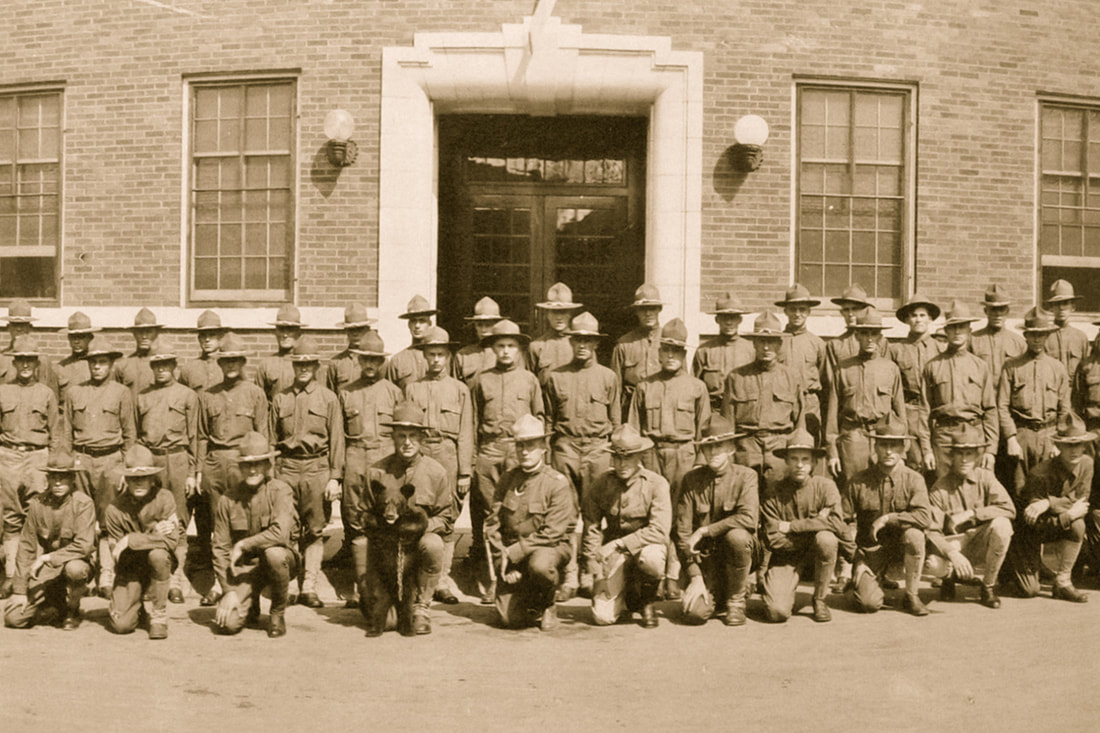|
Eveleth rejoiced with the rest of the nation after an armistice with Germany went to effect on November 11, 1918, near Compiègne, France. The people of Eveleth had helped support the war effort in many ways for a year and a half. They bought Liberty bonds, held food drives, and joined the Red Cross. The Eveleth Commercial Club created a four-acre garden near St. Mary's Lake, and Presbyterian minister Salvatore Terranova composed a song called "The Volunteers." Eveleth mines provided vital iron ore for military equipment; in fact, six in ten shells used by the Allies were made from Minnesota iron. Hundreds of Eveleth men, many of whom were members of Eveleth's National Guard Company F, served overseas, and although the following article says only one many from Eveleth was killed in action, a 1922 issue of the Eveleth Clarion said as many as fifteen Evelethians died in the war. Here is how the Eveleth News described festivities in Eveleth following the news that the Allied had defeated the Germans: The Eveleth News November 14, 1918: "EVELETH CELEBRATES ENDING OF WORLD WAR LAST MONDAY" Report of Signing of Armistice by the Enemy Received Here Early Monday Morning; Impromptu Parades Start Before Daylight and Continue Until Early Tuesday Morning. News of the signing of the armistice that will forever put an end to world was received in Eveleth Monday morning not long after the day started and from that time until the conclusion of the day and early into Tuesday Evelethians celebrated wildly.
Impromptu bands were organized at three o'clock in the morning and before they had paraded many minutes the streets were full of men, women and children wild with excitement and joy over the latest news from the front. Fire whistles, locomotive whistles, in fact everything that could be classed with a whistle was let loose. Church bells pealed the good joy. Automobile sirens were blown and the town forgot the things pertaining to business to join in the first celebration that will be remembered over the entire world. At eleven o'clock a parade was formed at the fire hall, the Eighth Battalion band leading it, followed by the Home Guards, Motor Corps and citizens of every creed, nationality, color and description, making a line about a mile long. This was the official parade of the day, made so by a verbal proclamation of the mayor. During the afternoon and evening the celebrating continued, fire whistles screeching, mine whistles blowing, church bells ringing and several local musical organizations keeping up the spirit. Men employed at the mines and other places in the city reporting to their respective duties in the morning were told by their employers that there would be nothing doing in the line of work that day. They were given a day off and told to celebrate as they had never celebrated before. From all reports, they did, too. Because of so many people being ill with influenza, the major requested that as little noise as possible be made after the first reports were received in order not to disturb those who were confined to their beds. The request was observed for about five minutes, but so enthused were the men who had hold of the whistle strings, bell ropes and other noise creations, that it was impossible to regulate it. From all reports, while it was not very pleasant to those who had to remain in bed, there were no serious effects. Monday was the day when old men were made young. Whitehaired men and women, who have been known as quiet individuals, reverted back to childhood. They shouted and took part in the parades and were as happy as the youngest schoolboy or girl. Everybody took part who was at all capable of doing it. The flag purchased a year ago by Lloyd Magee, who is the only Eveleth man who gave his life in the struggle, was at the head of the parade. Mayor Hatch carried it. The kaiser, bound with chains, was led through the streets amid the pleasure of the onlookers. Mayor Hatch states that he will have the flag, formerly owned by Magee, framed and that it will stand in Eveleth from this date on as a memorial to the only Evelethian who died for the cause of the United States and the allies while in action. While an armistice merely halts the war and does not actually end it, the terms laid down by the allies are so stringent that it will be practically impossible for the enemy to renew it. The war, therefore, may be considered as definitely ended. Over half of the article, which has not been reproduced here, listed the terms of the armistice.
2 Comments
|
©Eveleth Heritage Society 2024
Site by Promotions by Web
All images belong to the Eveleth Heritage Society unless otherwise noted.
Please do not reproduce, print, or use any photos in any context without written permission.
Site by Promotions by Web
All images belong to the Eveleth Heritage Society unless otherwise noted.
Please do not reproduce, print, or use any photos in any context without written permission.


 RSS Feed
RSS Feed

